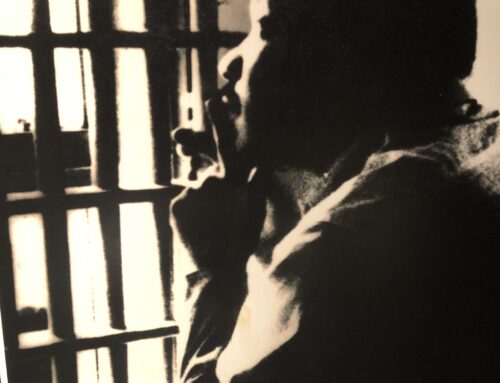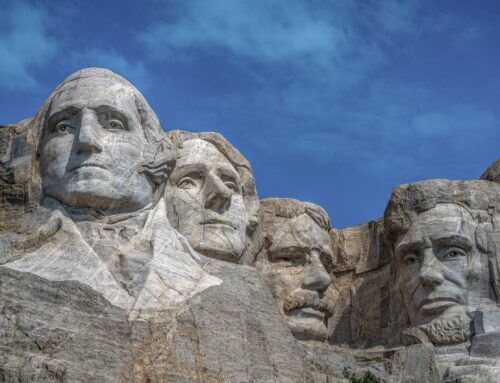
In the hit 1980’s TV show Hill Street Blues, which told the stories of inner city cops, Sergeant Esterhaus would end every precinct briefing with the famous line, “Let’s be careful out there.”
Esterhaus knew the work of police officers is inherently dangerous, but he also knew he could not keep his officers completely away from the danger. The job required a level of engagement that put them in harms way, but he cared about them nonetheless. So he left them with a faithful word of encouragement as they went to work.
Jesus had a similar desire for those of us who follow him:
I am not praying that you take them out of the world but that you protect them from the evil one. 16 They are not of the world, just as I am not of the world. 17 Sanctify them by the truth; your word is truth. 18 As you sent me into the world, I also have sent them into the world. 19 I sanctify myself for them, so that they also may be sanctified by the truth. John 17:15-19
Jesus prayed we would know the protection of God from the evil one, and at the very same time that as we go into the world, the truth would sanctify, cleanse, renew, and transform us. The very place where the Spirit of God conforms us into the image of Jesus is the very place filled with peril, danger, and travail.
Christians, however, say a lot of funny things about the world around us and the cultural tides that are crashing at our feet.
For example, you may have heard comments like these:
- This year has been brutal on me. Can we just have a reset on 2020? (Years do not create difficulty. God is providential over our days, even the bad ones.)
- I’m not a conspiracy theorist, but these masks are a mark of the beast.(Healthcare workers have been wearing masks for a very long time.)
- This world is gonna burn up anyway. What difference does any of this make? (God so loved the world. We are stewards of the world and fellow image bearers.)
All of these sentiments reveal something about how we think about God, heaven and earth, and our place in both.
But one funny (not “ha ha” funny, but “interesting” funny) comment I hear more than others takes on a few different forms. In essence, they all sound something like this: “I’m done with politics.”
The implication is that as a Christian, we can steer away from politics and focus on other things like family, friendships, and church. We can get married, rear children, and go to work each day disengaged from the political arena, and thus live with fewer things we dislike and more things we do like.
This comment also has a spiritual ring to it, as if Jesus calls us to more lofty, heavenly aspirations than political engagement can provide. You may have even heard someone say, “Let’s just preach the Gospel, and leave the politics to someone else.”
It’s true that political activism or social change doesn’t change a heart or save a soul, but it may be more important in creating an environment of personal transformation than we think.
When God made Adam and Eve, one of their responsibilities was to rule the earth:
Then God said, “Let us make man in our image, according to our likeness. They will rule the fish of the sea, the birds of the sky, the livestock, the whole earth, and the creatures that crawl on the earth.” Genesis 1:26
Abraham, the father of our faith, was a man of community influence and political power. Joseph preserved the people of God by his political service to Pharaoh. Moses led a nation to freedom. The Lord used the political throne of David to point to a greater, eternal kingdom to come. The prophets of God engaged political leaders. Jonah was sent to preach repentance to a foreign kingdom, and the king of that kingdom took notice and responded with sackcloth and ashes.
When Jesus was born, King Herod took notice. Throughout his ministry, Jesus regularly engaged with the political and religious leaders as he showed interest in the everyday life of the citizens of Palestine.
Following Jesus’ resurrection and ascension, the apostles, including Peter and later Paul, related to and shared the Gospel with magistrates and city leaders. Their Gospel ministry and church planting efforts naturally, or supernaturally, put Christians in close relationship to political leaders and to the interest of those serving in the public square.
In one famous moment, Paul spoke to the leading men of Athens,
From one man he has made every nationality to live over the whole earth and has determined their appointed times and the boundaries of where they live. 27 He did this so that they might seek God, and perhaps they might reach out and find him, though he is not far from each one of us. Acts 17:26-27
What must have been a stunning revelation, Paul announced that even the nations were ordered by God to create an environment that would make it possible for people everywhere to call upon the Lord.
So the public square is not a side game players play. It is, instead, the field of play for every follower of Jesus.
Not every Christian is called to run for Congress, but we are all called to love our neighbor. We are called to care about the things our neighbors care about. We are called to speak up for those who cannot speak up for themselves. We are called to advocate for the vulnerable. We are called to engage in healthy debate over things that influence this generation and the next.
Interestingly, as American evangelicals assumed we could limit our political engagement to voting our values, we became increasingly disillusioned by the political results of our efforts. So now many Christians are saying, “ If voting doesn’t work, then what’s the point of political engagement?”
Voting is a gift of God to the citizens of our republic, but it is only one of our responsibilities to our neighbors. If we are most known by who we voted for in the last election, I doubt seriously we’re going to make very much progress in making disciples of Jesus or joining His kingdom work. If we are most known by our political affiliations, then win or lose, after Election Day, we’ve likely lost a friend or two. More importantly, we’ve likely lost the opportunity to actually influence people who don’t already follow Jesus with us.
So rather than viewing the public square as a necessary evil where we need to fight it out to simply elect our candidate, what if followers of Jesus living in a nation that still allows the free exercise of religion could begin to view the public square as the fertile soil for living out our faith?
What happens when Christians begin to seriously pray for our political leaders and then treat them like we care about God answering those prayers? What happens when we step into the public space to serve schools, local governments, healthcare providers, and the business community to help them achieve their goals of serving the community? What happens when our greatest goal is the good of our neighbors?
That doesn’t sound like the divisive politics on our news feed, but perhaps the change our hearts long for, perhaps the public environment that sets the stage for advancing the Kingdom begins with how we care for the people closest to us. Just maybe our greatest opportunity for public influence is through the sanctifying work of the Holy Spirit in us as we learn to love people who think about important things from a totally different perspective. Perhaps the Lord will crystallize his Word in us as we learn to speak truth in love to the not-yet-convinced.
So rather than quitting on politics, maybe we should say, “I’m done with cultural Christianity.” Rather than huddling up in the safe, self-validating echo chambers of the Redeemed, let us step into the unfamiliar, uncomfortable, and sometimes dangerous places of foreign kingdoms that we may display a greater coming kingdom.
Perhaps we should reject the reluctance and rebellion of Jonah, and instead view the people around us like God views them—loved, valued, and worthy of Gospel hope. Rather than running away, perhaps this is our moment to run to the people who are farthest away.
It’s difficult. It will cost you something. So be careful out there. The Lord is with you.
Photo by Patrick Tomasso on Unsplash





